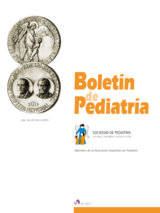Y… ¿qué hacemos con esa TSH alta?
B. Huidobro Fernández
Bol. Pediatr. 2019; 59 (249): 181 - 187
El hipotiroidismo subclínico es uno de los motivos de consulta más frecuentes en la consulta de Endocrinología Pediátrica y su manejo continúa siendo objeto de controversia. Ante un niño que presente una elevación aislada de TSH debemos tener presente que no siempre implica que presente una disfunción tiroidea y que se debe confirmar con una segunda determinación, ya que en más del 70% de los casos no se confirmará. Asimismo, deben descartarse interferencias analíticas, así como otras situaciones que pueden elevar la TSH de forma transitoria. En los casos persistentes está indicado el estudio etiológico, principalmente la determinación de anticuerpos antitiroideos y la realización de una ecografía. La mayoría de los casos el origen será idiopático o autoinmune. En general, el hipotiroidismo subclínico es una condición benigna, con bajo riesgo de evolución de hipotiroidismo franco, algo más elevado en los casos de origen autoinmune. El seguimiento de esos pacientes vendrá condicionado por la etiología y el riesgo de progresión a hipotiroidismo. Dado que no se ha demostrado que el hipotiroidismo subclínico afecte negativamente al crecimiento y tampoco al desarrollo cognitivo en mayores de 3 años, el tratamiento con levotiroxina no está justificado de forma rutinaria. En los últimos años algunos estudios han demostrado la relación entre el hipotiroidismo subclínico en niños y alteraciones proaterogénicas sutiles, pero existe controversia sobre si realmente se asocia a un riesgo aumentado de enfermedad cardiovascular en la edad adulta. Por otro lado, aunque el tratamiento con levotiroxina puede tener algún efecto beneficioso sobre dichas alteraciones, no está claro el impacto que puede tener a largo plazo.
And… What should we do with this high TSH?
Subclinical hypothyroidism is one of the most frequent reasons in the medical visit in the Pediatric Endocrinology office and its management continues to be an object of controversy. When a child has a single isolated elevation of TSH it should be kept in mind that this does not always imply that there is a thyroid disorder and it should be verified with a second measurement, since it will not be confirmed in over 70% of the cases. Furthermore, analytic interferences should be ruled out as well as other situations that may cause a transitory increase in the TSH. The etiological study is indicated in persistent cases, mainly the measurement of antithyroid antibodies and an ultrasound. In most of the cases, the origin will be idiopathic or autoimmune. In general, subclinical hypothyroidism is a benign condition, with low risk of evolution to frank hypothyroidism, which is somewhat higher in the cases having an autoimmune origin. Follow-up of these patients will be conditioned by the etiology and risk of progression to hypothyroidism. Since it has not been demonstrated that subclinical hypothyroidism negatively affects growth or cognitive development in children over 3 years of age, treatment with levothyroxine is not routinely justified. In recent years, some studies have demonstrated the relationship between subclinical hypothyroidism in children and subtle peroatherogenic alterations, however there is existing controversy on whether it is associated to an increased risk of cardiovascular disease in the adult age. On the other hand, although treatment with levothyroxine may have a beneficial effect on said alterations, the impact it may have in the long term is not clear.
Artículo completo (PDF) (230 kb.)
- Endocrino-Metabolismo
